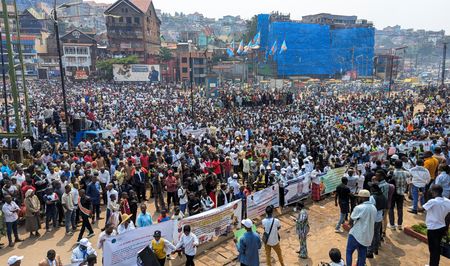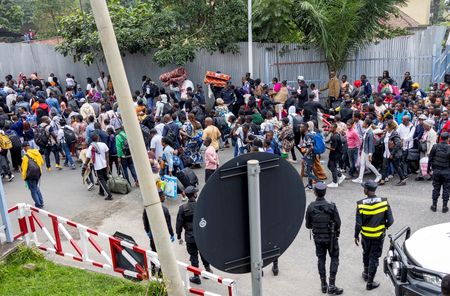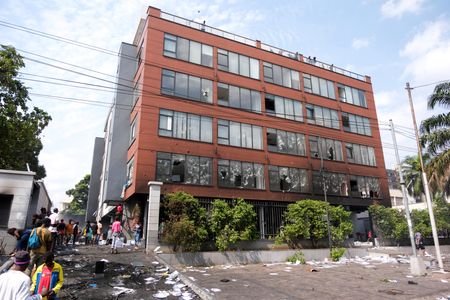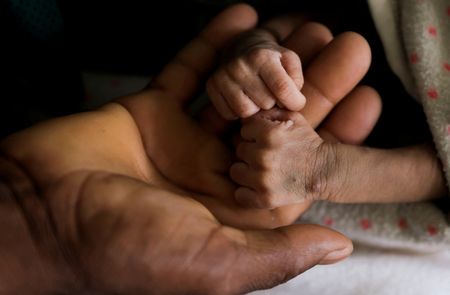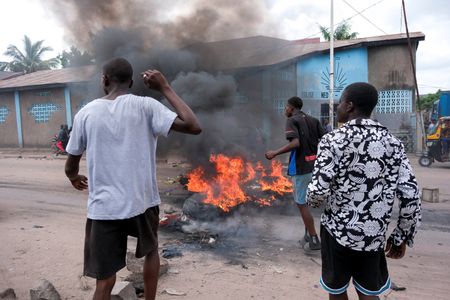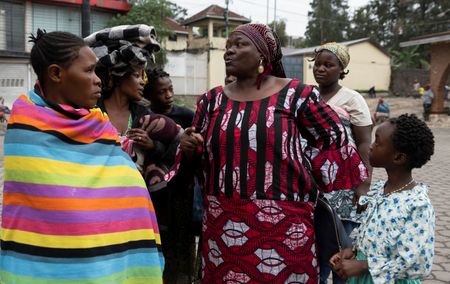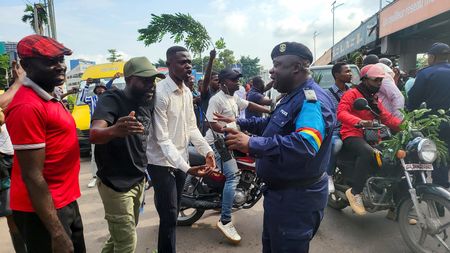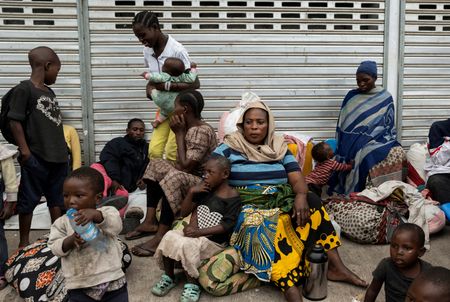By Arlette Bashizi, Djaffar Al-Katanty, Yassin Kombi and Stanis Bujakera
GOMA, Democratic Republic of Congo (Reuters) -Rwandan-backed rebels marched into eastern Congo’s largest city Goma on Monday, and the U.N. said they were supported by at least some regular Rwandan troops, in the worst escalation of a long-running conflict for more than a decade.
A rebel alliance spearheaded by the ethnic Tutsi-led M23 militia said it had seized the lakeside city of more than 2 million people, a hub for displaced people and aid groups lying on the border with Rwanda and last occupied by M23 in 2012.
Corneille Nangaa, leader of the Congo River Alliance that includes the M23, told Reuters his forces controlled the city.
His claim could not be independently verified amid conflicting accounts of the situation as the sound of explosions, heavy artillery and gunfire resounded all day.
On Monday evening, Rural Development Minister Muhindo Nzangi said the Congolese army controlled 80% of Goma, with Rwandan troops either on the city’s outskirts or back across the border.
The speaker of Congo’s national assembly, Vital Kamerhe, said a military assessment found that government troops and pro-government militias still held some positions.
He said President Felix Tshisekedi would address the nation on the matter, without giving a date.
But another Congolese official, who requested anonymity due to the sensitivity of the situation, and M23 sources, said the rebels held 90% of Goma.
“There are pockets of resistance,” a U.N. source said. “But even our troops are coming under heavy fire, both at the airport and at our (peacekeeping) base.”
The M23 said earlier on Monday that it had taken control of the offices of Congo’s national broadcaster in Goma, and two employees there confirmed the information.
At a briefing in New York, the senior U.N. official in Congo, Bruno Lemarquis, told reporters fighting was ongoing.
“There’s no question that there are Rwandan troops in Goma supporting the M23,” U.N. peacekeeping chief Jean-Pierre Lacroix told reporters at the same livestreamed event. “It’s difficult to tell exactly what the numbers are.”
One Goma resident told Reuters he had seen men in Rwandan army uniforms on Monday.
“At around 6 p.m., I went out to (see) what the situation was. I saw soldiers dressed in brand new Rwandan uniforms,” the resident of central Goma said.
Greg Ramm, country director for the Save the Children humanitarian organization in Congo, told an online briefing: “On any given moment, we have reports that neighbourhoods are calm. A few minutes later, we hear reports of new shelling.”
Congo accused Rwanda of sending troops into its territory, while Rwanda said fighting near the border threatened its own security. Rwanda’s army said Congolese shelling had killed five people and injured 26 in the town of Rubavu near the border.
Congolese soldiers on Mount Goma, a hill within the city, exchanged artillery fire with Rwandan troops on the other side of the border in the town of Gisenyi, according to two U.N. sources, while a Reuters reporter in Gisenyi saw columns of people fleeing the town.
In the first indication of civilian casualties in the fighting, Save the Children officials said an explosive device had fallen on a camp for displaced people in Goma on Sunday.
Artillery fire also struck a maternity hospital, killing and injuring civilians, including newborns and pregnant women, Lemarquis said.
The U.N. Security Council will meet again on Tuesday to discuss the crisis after a first meeting on Sunday, diplomats said.
Congo’s foreign ministry had written to the Security Council on Monday asking for a second meeting and more action from the U.N., including targeted sanctions against Rwanda and an order to withdraw troops.
LOOTING AND JAILBREAK
Unverified videos on social media showed local residents looting merchandise outside the airport customs warehouse, while a prison official said thousands of inmates had broken free from Goma’s main prison.
Hundreds of thousands of people displaced by recent fighting or earlier conflict have sought refuge in Goma and in surrounding camps. The arrival of M23 rebels in the city risks causing a new displacement and humanitarian crisis.
Roughly the size of Western Europe, the Democratic Republic of Congo is home to 100 million people, and its plentiful mineral supplies have long been coveted by Chinese and Western companies as well as by armed groups.
Its eastern borderlands are a tinderbox of rebel and militia fiefdoms stemming from two regional wars after Rwanda’s 1994 genocide, when Hutu extremists murdered close to 1 million Tutsis and moderate Hutus. Many Hutus, some genocide perpetrators and other refugees, fled into Congo after the genocide.
The U.N. has warned that the M23 offensive risks spiralling into a regional war.
Kenya said Congo’s president and his Rwandan counterpart Paul Kagame had agreed to attend an online meeting on Wednesday.
Rwanda has in recent years received aid and diplomatic support from Western governments despite rights groups criticising its record at home and in Congo. On Monday, it reacted angrily to criticism from Western powers.
FRESH OFFENSIVE IN 2022
Congo accuses Rwanda of using M23 to control swathes of Congolese territory to loot minerals, which Kigali denies.
M23 captured Goma in 2012 but soon withdrew after an agreement brokered by neighbouring nations. That led to the deployment of a new offensive-minded U.N. force, an overhaul of Congo’s army and diplomatic pressure on Rwanda, leading to the M23’s defeat in 2013 and a deal calling for its demobilisation.
But the group never fully disarmed and launched a fresh offensive in 2022 that has seen it capture large parts of mineral-rich North Kivu province.
In an interview before the Goma offensive, Nangaa, the alliance’s leader, suggested it aspired to replace Tshisekedi and his government.
“Our objective is neither Goma nor Bukavu but Kinshasa, the source of all the problems,” he said, referring to the Congolese capital, more than 1,500 km (930 miles) west of Goma.
(Additional reporting by Sonia Rolley in Paris, Ange Kasongo in Kinshasa, Erikas Mwisi in Bunia, Crispin Kyala in Bukavu, David Lewis, Giulia Paravicini, Hereward Holland, Monicah Mwangi and George Obulutsa in Nairobi, Sofia Christensen and AAnait Miridzhanian in Dakar and Michelle Nichols at the United Nations; and Stanis Bujakera in the U.S.; Writing by Estelle Shirbon and Sofia Christensen; Editing by Andrew Cawthorne, Sharon Singleton and Rod Nickel)

